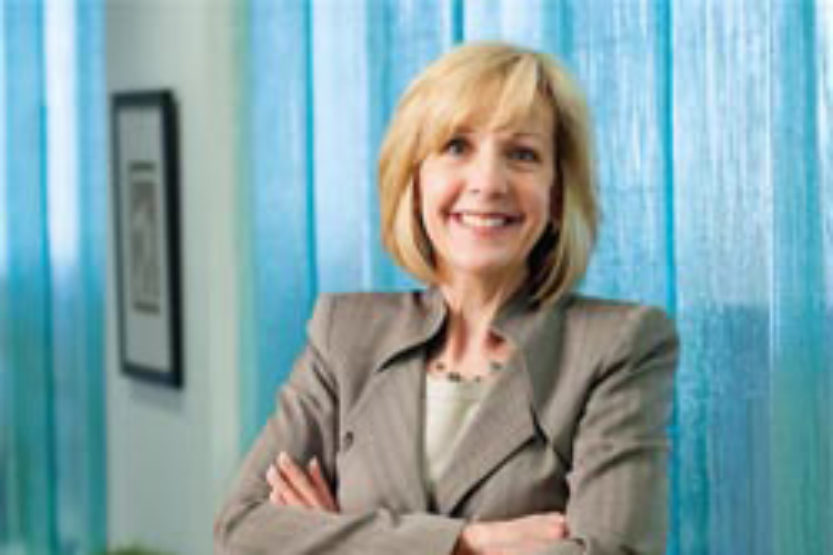Krista Harby McMasters
 “I never knew a gender distinction,” says Krista Harby McMasters, co-CEO of CliftonLarsonAllen. “I think that is how I was raised.”
“I never knew a gender distinction,” says Krista Harby McMasters, co-CEO of CliftonLarsonAllen. “I think that is how I was raised.” When she was appointed CEO of Clifton Gunderson in 2009, McMasters, 55, became the first woman to head a top-25 public accounting firm. Having guided the company through a 2012 merger, she now serves as co-CEO of CliftonLarsonAllen, one of the top 10 public accounting firms in the U.S.
I grew up in Catlin, a little town outside Danville, not too far from Champaign. There were 55 kids in my graduating class, and I probably went to grade school and high school with all of them.
I never knew a gender distinction. I think that’s how I was raised. Both of my grandmothers worked, and my mom worked. So that never seemed unusual to me.
In my senior year in high school I took a bookkeeping class. The class was more focused on people who were not going to college. But I took it and liked it, and I thought, “This sounds like something to do.” Both of my grandmothers were bookkeepers.
My parents weren’t wealthy. They were adamant that I wasn’t going to borrow money for college, and I needed to go to a community college first because of the cost. So I went to Danville Community College. I worked full time the whole time.
It’s hard to know how good you are when you’re in a high school of 55 kids. It’s not like I had a lot of competition. But I ended up getting the math award at the community college. It made me realize I had talent in that area.
At the time, the University of Illinois accountancy program was rated No. 1 or 2 in the country, and I was concerned that by not going till junior year I wouldn’t be able to compete. Back then the flunk-out course was intermediate accounting – that’s where a lot of students would end up switching to a business major. But I had a great professor for that course, professor Ronald Picur [now UIC professor emeritus]. The other course that was key for my career was auditing, and that professor, Richard Ziegler [now UI professor emeritus], was just excellent. He found ways to turn theoretical concepts into more practical applications, which is hard to do.
It was a tremendous educational experience. It kind of accelerated my success at Clifton Gunderson, because I had a great background that set me apart from the beginning.
I’ve read a lot about Eleanor Roosevelt. She always said you have to do the thing you really don’t want to, and that’s what makes you grow. There were a lot of things I forced myself to do.
Early on, my company asked me to get involved in what was then called the Accounting Standards Executive Committee in New York, which wrote standards for companies in the U.S. I didn’t want to do it. I felt I would be in way over my head. I was the only female, the youngest person on the committee, from one of the smallest firms. So it was intimidating. But I learned so much. It was a tremendous experience.
That’s kind of our firm: The culture is about finding what people’s passions and strengths are and putting them in situations that will build on that. I wasn’t happy with the materials we provided our people to perform audit work. So I went to the head of that practice, and he said, “Why don’t you do it?” Ultimately that involved creating a whole new manual for our firm. And as a result, I ended up being chosen the director of assurance services. I was only 32; I had only been with the firm 11 years.
Every time I raised my hand and said, “Here’s what I think we ought to do,” they would say, “OK, why don’t you do it?” After I was the assurance director, I wasn’t happy with the level of turnover – we were losing too many people. So I went to the CEO and said, “We need to do some things differently.” And he said, “Why don’t you write a white paper?” I ended up doing a lot of research and writing a paper on our strategic direction in the HR area. I never thought I would actually have to implement anything. But he ended up broadening my position beyond assurance, and I took over our HR function also.
Because I was head of HR, I was involved in how we were going to go about determining who the successor for the CEO was. A few of us wrote a plan. But it never occurred to me that the candidate was potentially me.
It was a non-issue in our firm for me to become CEO. I never faced any issues related to me being a woman. I do think it made it easier for me not having had children. I was traveling all the time. In these kinds of leadership roles, when you have 45 offices in the country, it’s a big travel position.
I didn’t see myself as a trailblazer, becoming the first woman CEO of a major accounting firm. But once it was announced, I got all kinds of questions, which made me realize this was a much bigger deal than I understood. It made me appreciate the importance of being responsible and showing women that they can be the champions of their own destiny.
Murphy is an award-winning journalist, editor of Urban Milwaukee.com and former editor of Milwaukee Magazine.

